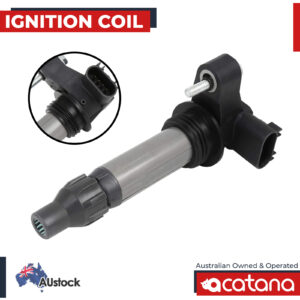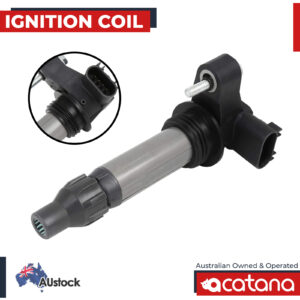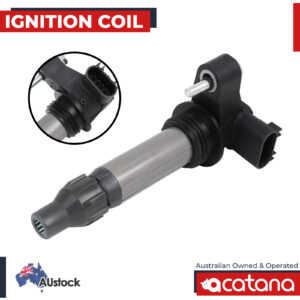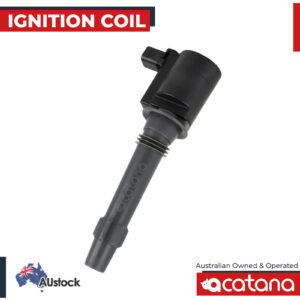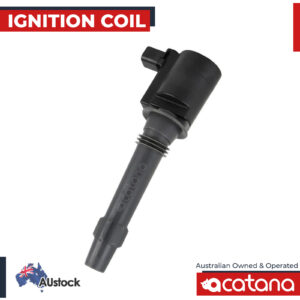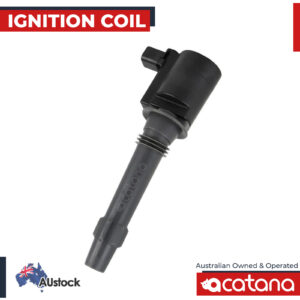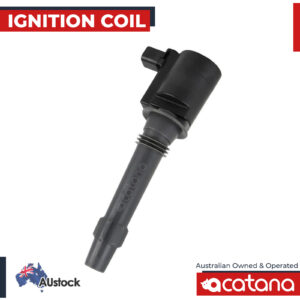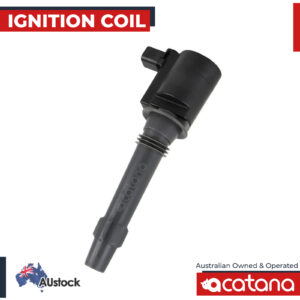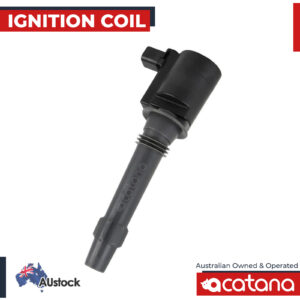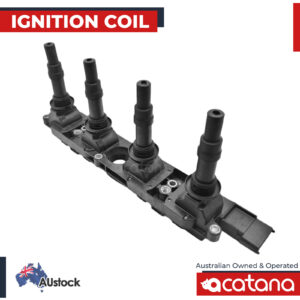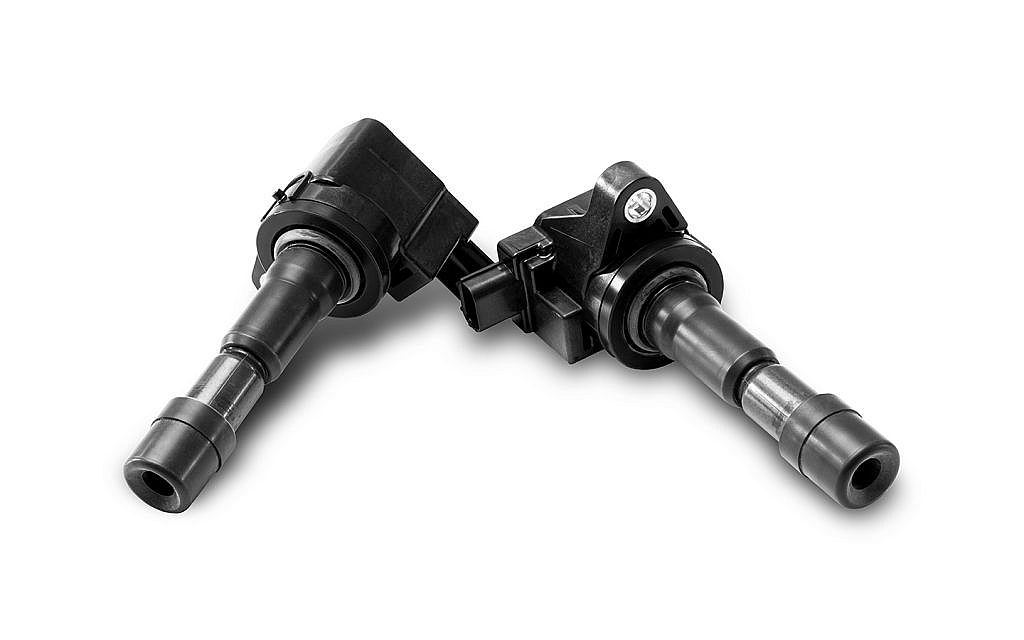Ignition Coils
Shop by Filters
Looking for ignition coils for your car? in this section you will find a wide range of high quality ignition coils.
Showing 1–24 of 62 results
-
SKU: 12590990-CCTS
Acatana Ignition Coil for Cadillac CTS 2008 – 2009 V6 3.6L LLT 12590990 Plug Pack
$28.90$69.90 -
SKU: 12590990-HCCG30
Acatana Ignition Coil for Holden Captiva CG 2011 2012 V6 3.0L LF1 LFW 12590990 Plug Pack
$28.90$69.90 -
SKU: 12590990-HCVEV6
Acatana Ignition Coil for Holden Commodore VE 2010 – 2011 V6 3.6L LLT 12590990 Plug Pack
$28.90$69.90 -
SKU: 12590990-HCVEVRX
Acatana Ignition Coil for Holden Commodore VE 2012 V6 3.6L LWR LFX 12590990 Plug Pack
$28.90$69.90 -
SKU: 12590990-HAVZAcatana Ignition Coil for Holden Commodore VZ 2004 2005 2006 2007 V6 3.6L 12590990 Plug PackIn stock
Acatana Ignition Coil for Holden Commodore VZ 2004 2005 2006 2007 V6 3.6L 12590990 Plug Pack
$28.90$69.90 -
SKU: 12590990-HSWL
Acatana Ignition Coil for Holden Statesman WL 2004 – 2007 V6 3.6L LY7 12590990 Plug Pack
$28.90$69.90 -
SKU: 12590990-HSWMY7
Acatana Ignition Coil for Holden Statesman WM 2004 – 2007 V6 3.6L LY7 12590990 Plug Pack
$28.90$69.90 -
SKU: 12590990-HSWM36Acatana Ignition Coil for Holden Statesman WM 2007 2008 2009 2010 2011 2012 V6 12590990 Plug PackIn stock
Acatana Ignition Coil for Holden Statesman WM 2007 2008 2009 2010 2011 2012 V6 12590990 Plug Pack
$28.90$69.90 -
SKU: 12590990-HSWM6
Acatana Ignition Coil for Holden Statesman WM 2010 – 2011 V6 3.6L LLT 12590990 Plug Pack
$28.90$69.90 -
SKU: 12590990-HSWM30Acatana Ignition Coil for Holden Statesman WM 2010 – 2012 V6 3.0L LF1 LFW 12590990 Plug PackIn stock
Acatana Ignition Coil for Holden Statesman WM 2010 – 2012 V6 3.0L LF1 LFW 12590990 Plug Pack
$28.90$69.90 -
SKU: 12590990-HSWMFX
Acatana Ignition Coil for Holden Statesman WM 2012 V6 3.6L LWR LFX 12590990 Plug Pack
$28.90$69.90 -
SKU: 12590990-OIGA
Acatana Ignition Coil for Opel Insignia GA 2012 V6 2.8L A28NER 12590990 Plug Pack
$28.90$69.90 -
SKU: 12590990-SGVAcatana Ignition Coil for Suzuki Grand Vitara JB632 2008 – 2010 V6 3.2L LFW 12590990 Plug PackIn stock
Acatana Ignition Coil for Suzuki Grand Vitara JB632 2008 – 2010 V6 3.2L LFW 12590990 Plug Pack
$28.90$69.90 -
SKU: 12590990-SGVX
Acatana Ignition Coil for Suzuki Grand Vitara XL-7 JC636 V6 3.6L HFV6 12590990 Plug Pack
$28.90$69.90 -
SKU: BA12A366A-FORFAI
This Ignition Coil for Ford Fairlane BA 07/2003 – 09/2005 BF 10/2005 – 12/2007 (4.0L). Ensure a reliable voltage from the start and more ignition energy, so your engine starts and runs smoothly. Reference OEM BA12A366A
$16.90$39.00 -
SKU: BA12A366A-OG
Ignition Coils is ensure a reliable voltage from the start and more ignition energy. Ignition Coil for Ford Fairlane BA BF Falcon Fairmont LTD Territory SX SY Pack. This part is also compatible with OEM BA12A366A
$19.90$39.00 -
SKU: BA12A366A-FRFRBABF
This Ignition Coil for Ford Fairmont BA 2003 – 2005 BF 2005 – 2007 4.0L. Ensure a reliable voltage from the start and more ignition energy, so your engine starts and runs smoothly. Reference OEM BA12A366A
$16.90$39.00 -
SKU: BA12A366A-FFBA
This Ignition Coils is ensure a reliable voltage from the start and more ignition energy. Ignition Coil for Ford Falcon BA 2002 – 2005 Pack. This part is also compatible with OEM BA12A366A
$16.90$39.00 -
SKU: BA12A366A-FFBABFFG
This Ignition Coil for Ford Falcon BA BF FG XR6 4.0L LPG E-GAS. Ensure a reliable voltage from the start and more ignition energy, so your engine starts and runs smoothly. Reference OEM BA12A366A
$16.90$39.00 -
SKU: BA12A366A-FFBF
This Ignition Coil is ensure a reliable voltage from the start and more ignition energy. Ignition Coil for Falcon BF 2005 – 2008 4.0L Pack. This part is also compatible with OEM BA12A366A
$16.90$39.00 -
SKU: BA12A366A-FORLTD
This Ignition Coil for Ford LTD BA 2002 – 2005 BF 2005 – 2007 (4.0L). Ensure a reliable voltage from the start and more ignition energy, so your engine starts and runs smoothly. Reference OEM BA12A366A
$16.90$39.00 -
SKU: BA12A366A-FORTER
This Ignition Coil for Ford Territory SX SY 2005 – 2011 (4.0L). Ensure a reliable voltage from the start and more ignition energy, so your engine starts and runs smoothly. Reference OEM BA12A366A
$16.90$39.00 -
SKU: 9119567-HAHIgnition Coil for Holden Astra AH 2004 – 2007 I4 1.8L Z18XE Engine Plug Pack Fits OEM 9119567Out of stock
Ignition Coils is ensure a reliable voltage from the start and more ignition energy. Ignition Coil for Holden Astra AH 2004 – 2007 I4 1.8L Z18XE Pack. This part is also compatible with OEM 9119567 90536194
$69.90$129.00 -
SKU: 9119567-HASIgnition Coil for Holden Astra TS 1998 – 2006 I4 1.8L X18XE1 Engine Plug Pack Fits OEM 9119567Out of stock
Ignition Coils is ensure a reliable voltage from the start and more ignition energy. Ignition Coil for Holden Astra TS Pack. This part is also compatible with OEM 9119567 90536194
$69.90$129.00
What are ignition coils ?
Ignition coils are crucial components in the ignition system of internal combustion engines, such as those found in cars and motorcycles. Their primary function is to convert the low voltage from the battery into the high voltage needed to ignite the air-fuel mixture in the engine’s combustion chambers.
Here’s how they work:
- Voltage Conversion: The ignition coil receives low-voltage electricity from the battery, typically around 12 volts. It then steps up this voltage to a much higher level, usually between 20,000 to 50,000 volts, or even higher in some high-performance engines.
- Induction: Ignition coils work on the principle of electromagnetic induction. Inside the ignition coil, there are two sets of wire windings: the primary winding and the secondary winding. When the primary winding receives the low voltage, it creates a magnetic field around it.
- Magnetic Field Collapse: When the flow of current to the primary winding is interrupted, such as by the opening of the ignition points or the firing of the ignition coil in electronic ignition systems, the magnetic field collapses rapidly. This collapse induces a high voltage in the secondary winding due to electromagnetic induction.
- High Voltage Output: The high-voltage output from the secondary winding is then sent to the spark plugs, where it jumps the gap between the electrodes, creating a spark. This spark ignites the compressed air-fuel mixture in the engine’s cylinders, causing combustion and powering the engine.
In modern engines, ignition coils are often integrated into the engine’s ignition system, which may include electronic controls to precisely time the spark and improve engine performance and fuel efficiency.
How long do ignition coils last ?
The lifespan of ignition coils can vary depending on several factors, including the quality of the component, driving conditions, maintenance, and environmental factors. Generally, ignition coils are designed to last for a considerable amount of time, often tens of thousands of miles or several years. However, they can fail prematurely due to various reasons such as:
- Wear and Tear: Over time, the internal components of the ignition coil, such as the insulation and windings, can degrade due to heat, vibration, and electrical stress.
- Contaminants: Exposure to moisture, dirt, oil, and other contaminants can accelerate the degradation of the ignition coil components, leading to premature failure.
- Overheating: Excessive heat, often caused by engine overheating or poor airflow around the ignition coil, can cause insulation breakdown and shorten the coil’s lifespan.
- Electrical Issues: Voltage spikes, excessive current, or other electrical issues within the vehicle’s electrical system can damage the ignition coil and cause it to fail.
- Poor Maintenance: Neglecting regular maintenance, such as replacing worn-out spark plugs or faulty ignition wires, can put additional strain on the ignition coil and contribute to its early failure.
In general, most vehicles may not need ignition coil replacement during their lifetime if they are well-maintained and driven under normal conditions. However, if you notice symptoms of ignition coil failure, such as engine misfires, rough idle, or difficulty starting the engine, it’s essential to have the ignition system inspected by a qualified mechanic, as failing ignition coils can lead to decreased engine performance and fuel efficiency.
Signs of a faulty ignition coil
Several signs can indicate a faulty ignition coil in a vehicle. Here are some common symptoms to watch out for:
- Engine Misfires: Ignition coils play a crucial role in providing the spark needed to ignite the air-fuel mixture in the engine cylinders. A faulty ignition coil may result in sporadic or consistent engine misfires, where the engine may hesitate, jerk, or run rough.
- Rough Idle: If an ignition coil is failing, it may cause the engine to idle roughly. You might notice the engine shaking or vibrating more than usual when the vehicle is at a standstill.
- Difficulty Starting: A failing ignition coil can lead to difficulty starting the engine, especially when the engine is cold. You may experience extended cranking times before the engine eventually starts, or it may fail to start altogether.
- Decreased Fuel Efficiency: Ignition coil issues can lead to incomplete combustion in the engine cylinders, resulting in decreased fuel efficiency. If you notice a sudden drop in gas mileage without any other apparent cause, a faulty ignition coil could be to blame.
- Check Engine Light: A malfunctioning ignition coil can trigger the vehicle’s onboard diagnostics system to illuminate the check engine light. This warning light indicates that the engine control module (ECM) has detected a problem and stored a diagnostic trouble code (DTC) related to the ignition system.
- Engine Stalling: In severe cases, a faulty ignition coil can cause the engine to stall while driving, especially under load or at higher speeds. This is a dangerous situation that requires immediate attention.
If you experience any of these symptoms, it’s essential to have the vehicle inspected by a qualified mechanic as soon as possible. Ignoring ignition coil problems can lead to further damage to the engine and other components, as well as compromised vehicle performance and safety.
Showing 1–24 of 62 results




